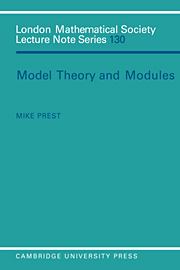Book contents
- Frontmatter
- Contents
- Introduction
- Acknowledgements
- Notations and conventions
- Remarks on the development of the area
- Section summaries
- Chapter 1 Some preliminaries
- Chapter 2 Positive primitive formulas and the sets they define
- Chapter 3 Stability and totally transcendental modules
- Chapter 4 Hulls
- Chapter 5 Forking and ranks
- Chapter 6 Stability-theoretic properties of types
- Chapter 7 Superstable modules
- Chapter 8 The lattice of pp-types and free realisations of pp-types
- Chapter 9 Types and the structure of pure-injective modules
- Chapter 10 Dimension and decomposition
- Chapter 11 Modules over artinian rings
- Chapter 12 Functor categories
- Chapter 13 Modules over Artin algebras
- Chapter 14 Projective and flat modules
- Chapter 15 Torsion and torsionfree classes
- Chapter 16 Elimination of quantifiers
- Chapter 17 Decidability and undecidability
- Problems page
- Bibliography
- Examples index
- Notation index
- Index
Chapter 5 - Forking and ranks
Published online by Cambridge University Press: 15 December 2009
- Frontmatter
- Contents
- Introduction
- Acknowledgements
- Notations and conventions
- Remarks on the development of the area
- Section summaries
- Chapter 1 Some preliminaries
- Chapter 2 Positive primitive formulas and the sets they define
- Chapter 3 Stability and totally transcendental modules
- Chapter 4 Hulls
- Chapter 5 Forking and ranks
- Chapter 6 Stability-theoretic properties of types
- Chapter 7 Superstable modules
- Chapter 8 The lattice of pp-types and free realisations of pp-types
- Chapter 9 Types and the structure of pure-injective modules
- Chapter 10 Dimension and decomposition
- Chapter 11 Modules over artinian rings
- Chapter 12 Functor categories
- Chapter 13 Modules over Artin algebras
- Chapter 14 Projective and flat modules
- Chapter 15 Torsion and torsionfree classes
- Chapter 16 Elimination of quantifiers
- Chapter 17 Decidability and undecidability
- Problems page
- Bibliography
- Examples index
- Notation index
- Index
Summary
Linear independence in vectorspaces and transcendence in algebraically closed fields both are kinds of independence. In fact, they are rather simple examples of a very general notion of independence which has arisen in model theory and which is dignified by the name “nonforking”. Stability theory is concerned with classifying and investigating structures using this and derived concepts.
We begin by characterising (non-)forking in modules. Thus we give meaning to the phrases: the type q is a non-forking (=free) extension of the type p; the element a is independent from the set B over the set C. The description is in terms of the groups G(−) introduced in §2.2. Since some of the material in this and the next two chapters is used in algebraic applications, I do not assume that the reader has already encountered ideas from stability theory and so I give illustrative examples and state (and, I hope, explain) the main background theorems. All of that is in the first section.
In the examples which I mentioned above, there is a dichotomy – algebraic completely dependent)/independent – but most theories are more complicated than this, with elements exhibiting degrees of dependence on one another. In at least some cases there are ordinal ranks which measure degree of dependence: these are discussed in §2. It turns out that the rank of a type, p, is the foundation rank of the connected component of the associated group G(p) in the lattice of such connected groups. It follows that, for modules, the various stability-theoretic ranks coincide in so far as they exist (this is not true of arbitrary stable theories).
- Type
- Chapter
- Information
- Model Theory and Modules , pp. 109 - 131Publisher: Cambridge University PressPrint publication year: 1988



